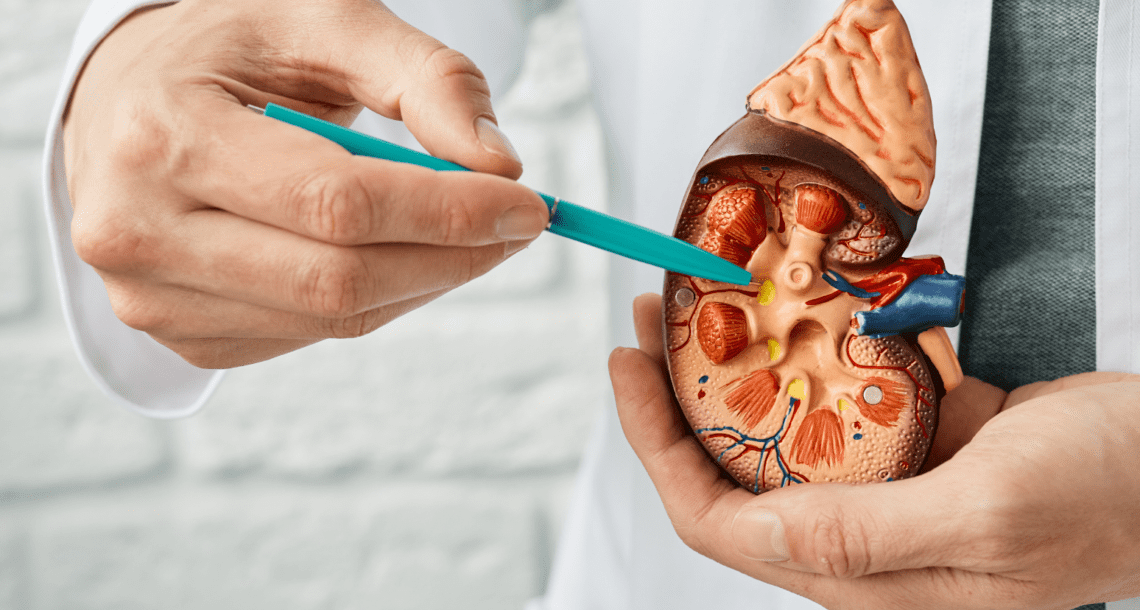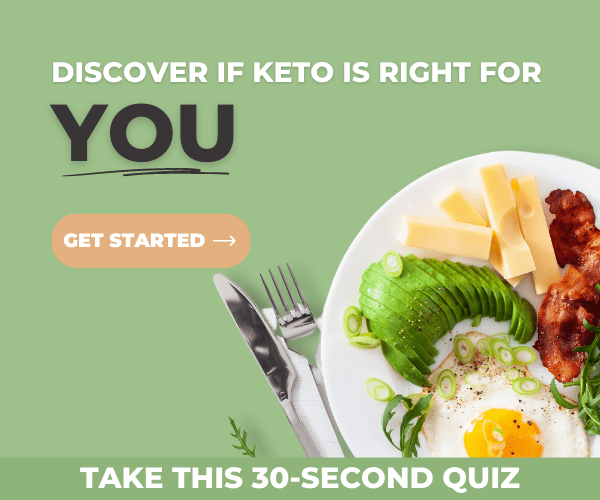Keto and Polycystic Kidney Disease: Is the Keto Diet a Good Option?

Polycystic kidney disease or PKD is a common genetic disorder in which fluid-filled cysts grow in the kidneys. If left untreated, PKD can lead to reduced kidney function and eventually kidney failure. [1]
One of the ways to help treat PKD is making lifestyle and nutrition changes.
You may have heard about the new retrospective case series study by Thomas Weimbs and colleagues suggesting that the ketogenic diet is safe and potentially beneficial for individuals with autosomal dominant polycystic kidney disease (ADPKD), the most common form of PKD.
It’s actually the first study to gather real-life observations of ADPKD patients undertaking keto diet interventions (KDIs).
This article discusses keto and polycystic kidney disease, starting with a background on this condition. Then, we’ll dive into the latest research—how the study was done, the findings, and safety concerns to be aware of.
What Is Polycystic Kidney Disease (PKD)?
Polycystic Kidney Disease is an inherited kidney disorder characterized by fluid-filled cysts forming on one or both kidneys. These cysts continuously grow in size, which then compresses the nephrons (the filtering unit of your kidneys) and causes your kidneys to decline. [2]
More specifically, PKD affects important bodily functions, such as blood pressure and red blood cells production.
PKD affects more than half a million people in the United States. Furthermore, 90% of all PKD cases are autosomal dominant PKD (ADPKD), also called adult PKD, the most common form of PKD. [3]
If you have a parent with PKD, it means that you also have a chance of getting this condition.
What’s interesting about ADPKD is that adults can live with this condition for years without being aware of it. This is because ADPKD doesn’t cause obvious problems until the cysts grow up to a certain size.
Usually, adults seek help because they notice blood in their urine. Other signs and symptoms include: [4]
- Pain in the lower back, abdominal area, chest, and leg
- Headache
- Decrease in appetite
- Weakness and fatigue
- Hypertension or high blood pressure
- Abnormal kidney enlargement with cysts (discovered upon ultrasound, CT scan, or MRI)
Glucose Strongly Affects the Growth of Renal Cysts
Research shows that polycystic kidney disease cysts rely on glucose as their fuel source. High glucose upregulates or increases the calcium-activated chloride channel ANO1, which has a huge impact on the enlargement of kidney cysts. [5] [6]
Interestingly, many patients with ADPKD also suffer from type 2 diabetes, a metabolic disorder characterized by high blood glucose levels and insulin resistance.
The problem is that the standard Western diet is high in carbohydrates, which provides your body with a continuous supply of glucose. This can be problematic for those who are trying to reduce the negative effects associated with polycystic kidney disease, such as high blood pressure and fatigue.
In contrast, the ketogenic diet reduces blood glucose levels by restricting carbs to 50 grams or less per day and increasing dietary fats. Carb restriction forces your body to burn its stored fat and produce ketone bodies—like beta-hydroxybutyrate (BHB) and acetoacetate (AcAc)—that now serve as an alternative fuel source to glucose.
Is the Keto Diet Good for PKD? Findings from New Research
The first-of-its-kind research done by Thomas Weimbs and his colleagues, now published in the Clinical Kidney Journal, made a surprising discovery:
Polycystic kidney disease patients who self-initiated ketogenic diet interventions for an average of 6 months reported improvements in their well-being, body weight, and PKD-related health issues.
These interventions that induced a state of ketosis included the following:
- A ketogenic diet: eating very low-carb, high-fat, and moderate protein
- Time-restricted diet: a form of fasting where you compress your eating window
- Calorie restriction: eating fewer calories than you’re normally used to
Note: This is a follow-up to a study by Thomas Weimbs in 2019 in which lab mice with PKD were put into ketosis. Results from that study found that ketosis ameliorates renal cyst growth in polycystic kidney disease or even reverses it. We also summarized the findings of that study in this article.
How the New Study Was Conducted and the Results
Thomas Weimbs and colleagues recruited 131 polycystic kidney disease patients who were mainly based in the U.S. These patients included males and females (most of them were males) and followed a keto diet intervention for about 6 months:
- 74 of the patients did a ketogenic diet. They tracked their macronutrient intake and some even measured their ketone levels which had readings of ~1.15 mmol/L (in the blood) and ~1.75 mmol/L (in the urine). These results indicated ketosis.
- 52 of the patients restricted their eating time to an 8-hour window and fasted for 16 hours. This is also known as the 16/8 fast, which is a common intermittent fasting approach on the keto diet.
- 5 of the patients restricted their calorie intake.
To learn the effects of these keto diet interventions, the researchers asked questions pertaining to their health and well-being, health issues due to ADPKD, ADPKD symptoms, and old health issues that have changed after starting their diet.
Here were some of the things that improved based on the findings:
- Weight loss: A study from 2018 noted that being overweight or obese is associated with disease progression in early-stage ADPKD patients.[6] In this current study, results showed that about 90% of the participants lost weight, with about 9.1 kg of weight reduction.
- Blood pressure: 74% of the participants had been diagnosed with arterial hypertension or had high blood pressure. 64% of those participants saw improvements in their blood pressure, from 132/85 to 118/76 mmHg. Furthermore, 23 participants reported a decrease in their blood pressure medication.
- Kidney function: When asked whether they’d experienced changes in their kidney function after starting a keto diet, 45 participants noted an increase in kidney function. Additionally, 17 participants with documented ketosis had experienced increases in their estimated glomerular filtration rate (eGFR) by 7.3 mL/min/1.73 m2.
- Health issues: Before starting keto diet interventions, the participants identified health issues like flank/back pain (majority had this), fatigue, abdominal fullness, acid reflux, anxiousness, headache, constipation, blood in urine, and infection. 67% of the participants reported an improvement in these issues after starting the KDIs.
Possible Side Effects of a Keto Diet on Those with Polycystic Kidney Disease
According to the study, commonly reported health issues after starting the KDIs were fatigue, hunger, bad breath, headache, excessive thirst, and “keto flu.” These are expected side effects of keto diets and subside over time, which happened to those participating in the study.
Increased cholesterol levels were also reported by 22 participants. They noted an increase in total cholesterol of 13 mg/dL and an increase in LDL cholesterol of 8.5 mg/dL. Meanwhile, no changes were noted in triglycerides and HDL cholesterol.
It’s important to note that some people who go low-carb or keto may notice their total cholesterol and LDL cholesterol levels increase. It’s possible that these individuals are “lean-mass hyperresponders,” meaning that they’re more likely to have higher LDL levels on a low-carb diet. [7]
Conclusion
Strategies like following a very low-carb, high-fat keto diet, fasting, and caloric restriction lower glucose and raise ketone levels, which can prevent renal cysts from growing.
The findings from this new study show that ketogenic diet interventions could potentially save the lives of polycystic kidney disease patients by improving kidney function and reducing health issues arising from the condition.
References
National Kidney Foundation. Polycystic Kidney Disease. Retrieved from kidney.org
Kraus, A., Schley, G., Kunzelmann, K. et al. Glucose promotes secretion-dependent renal cyst growth. J Mol Med 94, 107–117 (2016). https://doi.org/10.1007/s00109-015-1337-4
U.S. Department of Health and Human Services. (2017, January). What is polycystic kidney disease? National Institute of Diabetes and Digestive and Kidney Diseases. Retrieved July 6, 2022, from niddk.nih.gov
Bajwa, Z.H., Sial, K.A., Malik, A.B., Steinman, T.I. (2004). Pain patterns in patients with polycystic kidney disease. Kidney International, 66(4), 1561-1569. DOI: https://doi.org/10.1111/j.1523-1755.2004.00921.x
Kraus, A., Schley, G., Kunzelmann, K. et al. Glucose promotes secretion-dependent renal cyst growth. J Mol Med 94, 107–117 (2016). https://doi.org/10.1007/s00109-015-1337-4
Tanaka, T., & Nangaku, M. (2014). ANO1: an additional key player in cyst growth. Kidney international, 85(5), 1007–1009. https://doi.org/10.1038/ki.2013.436
Nowak, K. L., You, Z., Gitomer, B., Brosnahan, G., Torres, V. E., Chapman, A. B., Perrone, R. D., Steinman, T. I., Abebe, K. Z., Rahbari-Oskoui, F. F., Yu, A., Harris, P. C., Bae, K. T., Hogan, M., Miskulin, D., & Chonchol, M. (2018). Overweight and Obesity Are Predictors of Progression in Early Autosomal Dominant Polycystic Kidney Disease. Journal of the American Society of Nephrology : JASN, 29(2), 571–578. https://doi.org/10.1681/ASN.2017070819










